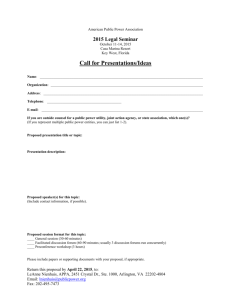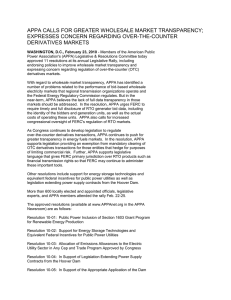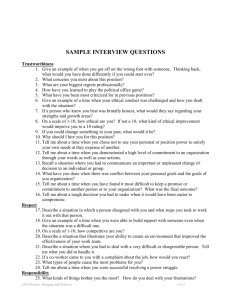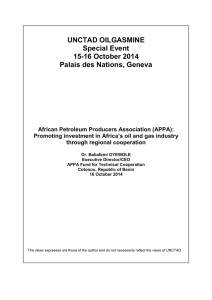1 International Video Competition Terms and Conditions Who can
advertisement
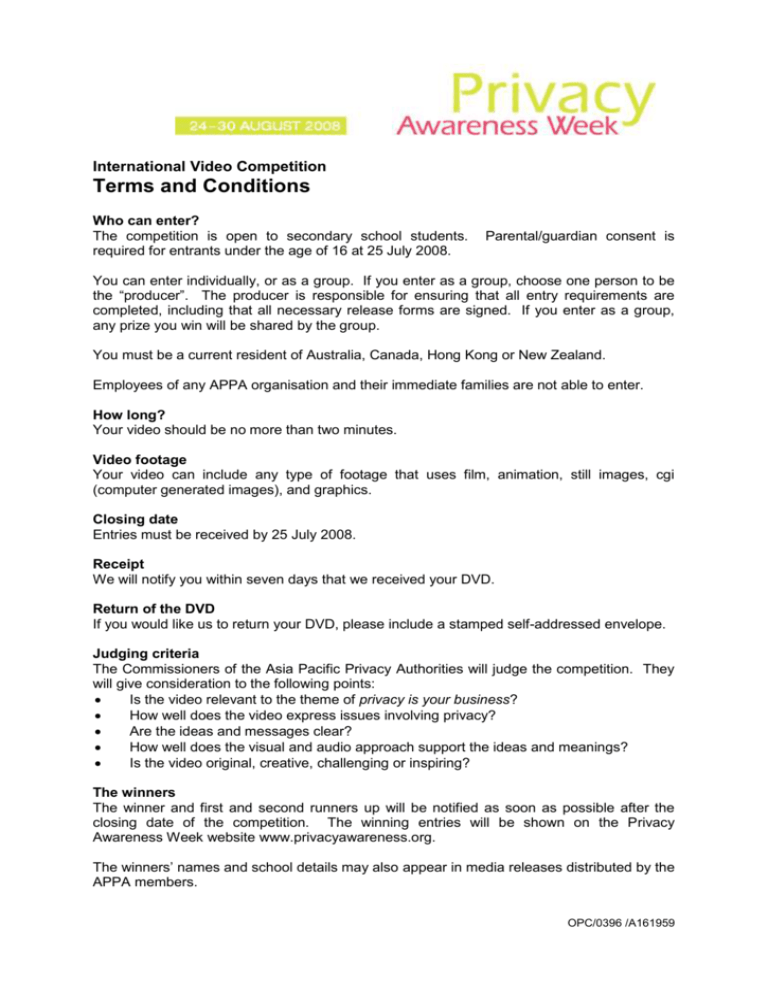
International Video Competition Terms and Conditions Who can enter? The competition is open to secondary school students. required for entrants under the age of 16 at 25 July 2008. Parental/guardian consent is You can enter individually, or as a group. If you enter as a group, choose one person to be the “producer”. The producer is responsible for ensuring that all entry requirements are completed, including that all necessary release forms are signed. If you enter as a group, any prize you win will be shared by the group. You must be a current resident of Australia, Canada, Hong Kong or New Zealand. Employees of any APPA organisation and their immediate families are not able to enter. How long? Your video should be no more than two minutes. Video footage Your video can include any type of footage that uses film, animation, still images, cgi (computer generated images), and graphics. Closing date Entries must be received by 25 July 2008. Receipt We will notify you within seven days that we received your DVD. Return of the DVD If you would like us to return your DVD, please include a stamped self-addressed envelope. Judging criteria The Commissioners of the Asia Pacific Privacy Authorities will judge the competition. They will give consideration to the following points: Is the video relevant to the theme of privacy is your business? How well does the video express issues involving privacy? Are the ideas and messages clear? How well does the visual and audio approach support the ideas and meanings? Is the video original, creative, challenging or inspiring? The winners The winner and first and second runners up will be notified as soon as possible after the closing date of the competition. The winning entries will be shown on the Privacy Awareness Week website www.privacyawareness.org. The winners’ names and school details may also appear in media releases distributed by the APPA members. OPC/0396 /A161959 2 Prizes There will be prizes for the international winners. First prize: a video camera First runner up: AU$500 gift voucher Second runner up: AU$250 gift voucher. Each jurisdiction may choose to award prizes to their regional winners. Copyright clearance and permissions You need to get permission to use music, film at locations, film people, and film artworks. Please read the following information carefully, and use the release forms to gain the necessary permissions. Music Copyright is how composers and songwriters make a living from their work. Copyright owners have a number of exclusive rights to control how and when their work is used, and to negotiate payment for this use. If you are going to use music that you have on CD or found on the internet, then you must get permission to use it in your film. That means that you need to either contact the artist or band directly (which may be difficult), or the organisation in your country that gives permission on behalf of other artists to use their music. In New Zealand and Australia, that organisation is Australian Performing Rights Association (APRA). Go to www.apra.co.nz or www.amcos.com.au. In Hong Kong you need to contact the Composers and Authors Society of Hong Kong Limited (CASH). Go to www.cash.org.hk. In Canada you need to contact the Society of Composers, Authors and Music Publishers of Canada (SOCAN). Go to www.socan.ca. Rather than using someone else’s music, you could write and record your own music, or ask a friend who is a musician, or in a band, to create some original music. Locations You need to get permission to film at certain locations. For example, if you want to film at an airport then you must ask permission first. If you are not sure whether you should get permission or not, it would pay to check. You can explain that you are making a short video for a competition for Privacy Awareness Week. Actors and people appearing in your film You must get permission from anyone who appears in your film (friends, teachers, family, children and strangers) that it’s okay to be filmed. They need to know that your film may be widely shown, particularly if it wins a prize. You don’t need to get permission from everyone on a busy street, but if you do a close-up of a person on a bus, for example, then you should ask them if it’s okay with them to be in the video and get them to sign a performance release form. Art If you want to include art in your film, you need to make sure the artist is happy for you to do so. OPC/0396/A161959 3 Entrant requirements On entering the competition, the video producer must guarantee that: The video was made especially for the APPA Privacy Awareness Week 24-30 August secondary school video competition. All the necessary release forms (music, performance, location, and artwork) have been completed and signed. All the details in the entry form are true and correct. Any producer or video-maker under 16 has received a parent’s or guardian’s consent to enter. APPA’s rights Showing the winning entries APPA has the right to show the winning entries and state the winners’ names and schools: On its website www.privacyawareness.org, and on the individual APPA members’ websites. As part of any publicity or initiatives associated with Privacy Awareness Week. This could include showing the winning videos at public functions or seminars. As part of any media statements. This would allow the media to show the videos on television and/or media websites. Technical APPA will endeavour to view all the DVDs sent to them for the competition. If there are any technical problems associated with any DVD then APPA will liaise with the entrant with the aim of solving any technical problems with them. Incomplete entries If entries are incomplete, for example, if some or all of the release forms are not included, then APPA will liaise with the entrant with the aim of receiving a completed entry. OPC/0396/A161959



